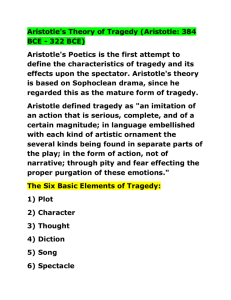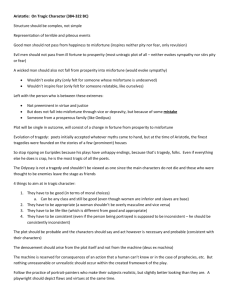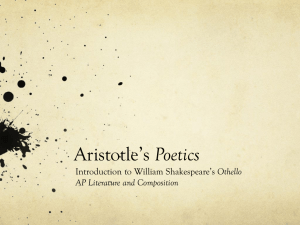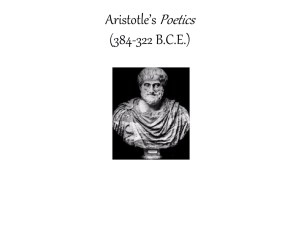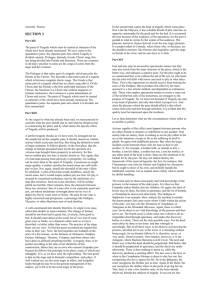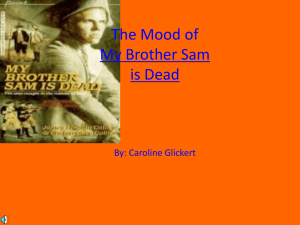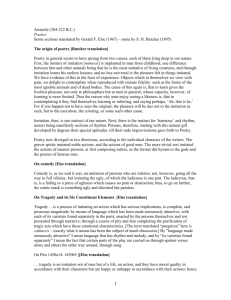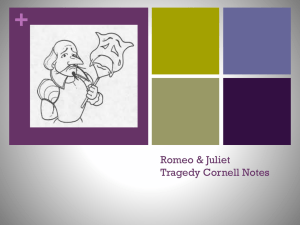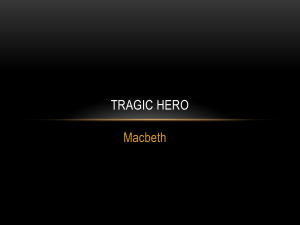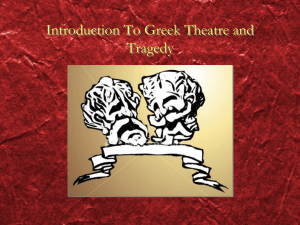Name: Class Period: ________Date: Excerpt from Aristotle`s Poetics
advertisement
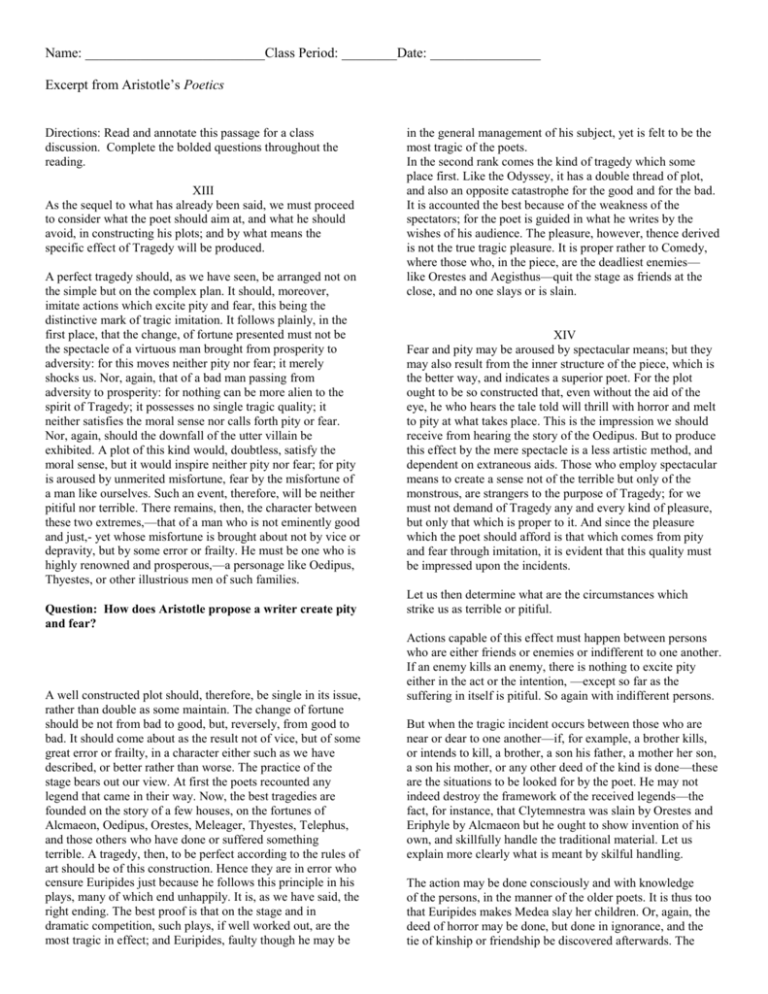
Name: __________________________Class Period: ________Date: ________________ Excerpt from Aristotle’s Poetics Directions: Read and annotate this passage for a class discussion. Complete the bolded questions throughout the reading. XIII As the sequel to what has already been said, we must proceed to consider what the poet should aim at, and what he should avoid, in constructing his plots; and by what means the specific effect of Tragedy will be produced. A perfect tragedy should, as we have seen, be arranged not on the simple but on the complex plan. It should, moreover, imitate actions which excite pity and fear, this being the distinctive mark of tragic imitation. It follows plainly, in the first place, that the change, of fortune presented must not be the spectacle of a virtuous man brought from prosperity to adversity: for this moves neither pity nor fear; it merely shocks us. Nor, again, that of a bad man passing from adversity to prosperity: for nothing can be more alien to the spirit of Tragedy; it possesses no single tragic quality; it neither satisfies the moral sense nor calls forth pity or fear. Nor, again, should the downfall of the utter villain be exhibited. A plot of this kind would, doubtless, satisfy the moral sense, but it would inspire neither pity nor fear; for pity is aroused by unmerited misfortune, fear by the misfortune of a man like ourselves. Such an event, therefore, will be neither pitiful nor terrible. There remains, then, the character between these two extremes,—that of a man who is not eminently good and just,- yet whose misfortune is brought about not by vice or depravity, but by some error or frailty. He must be one who is highly renowned and prosperous,—a personage like Oedipus, Thyestes, or other illustrious men of such families. Question: How does Aristotle propose a writer create pity and fear? A well constructed plot should, therefore, be single in its issue, rather than double as some maintain. The change of fortune should be not from bad to good, but, reversely, from good to bad. It should come about as the result not of vice, but of some great error or frailty, in a character either such as we have described, or better rather than worse. The practice of the stage bears out our view. At first the poets recounted any legend that came in their way. Now, the best tragedies are founded on the story of a few houses, on the fortunes of Alcmaeon, Oedipus, Orestes, Meleager, Thyestes, Telephus, and those others who have done or suffered something terrible. A tragedy, then, to be perfect according to the rules of art should be of this construction. Hence they are in error who censure Euripides just because he follows this principle in his plays, many of which end unhappily. It is, as we have said, the right ending. The best proof is that on the stage and in dramatic competition, such plays, if well worked out, are the most tragic in effect; and Euripides, faulty though he may be in the general management of his subject, yet is felt to be the most tragic of the poets. In the second rank comes the kind of tragedy which some place first. Like the Odyssey, it has a double thread of plot, and also an opposite catastrophe for the good and for the bad. It is accounted the best because of the weakness of the spectators; for the poet is guided in what he writes by the wishes of his audience. The pleasure, however, thence derived is not the true tragic pleasure. It is proper rather to Comedy, where those who, in the piece, are the deadliest enemies— like Orestes and Aegisthus—quit the stage as friends at the close, and no one slays or is slain. XIV Fear and pity may be aroused by spectacular means; but they may also result from the inner structure of the piece, which is the better way, and indicates a superior poet. For the plot ought to be so constructed that, even without the aid of the eye, he who hears the tale told will thrill with horror and melt to pity at what takes place. This is the impression we should receive from hearing the story of the Oedipus. But to produce this effect by the mere spectacle is a less artistic method, and dependent on extraneous aids. Those who employ spectacular means to create a sense not of the terrible but only of the monstrous, are strangers to the purpose of Tragedy; for we must not demand of Tragedy any and every kind of pleasure, but only that which is proper to it. And since the pleasure which the poet should afford is that which comes from pity and fear through imitation, it is evident that this quality must be impressed upon the incidents. Let us then determine what are the circumstances which strike us as terrible or pitiful. Actions capable of this effect must happen between persons who are either friends or enemies or indifferent to one another. If an enemy kills an enemy, there is nothing to excite pity either in the act or the intention, —except so far as the suffering in itself is pitiful. So again with indifferent persons. But when the tragic incident occurs between those who are near or dear to one another—if, for example, a brother kills, or intends to kill, a brother, a son his father, a mother her son, a son his mother, or any other deed of the kind is done—these are the situations to be looked for by the poet. He may not indeed destroy the framework of the received legends—the fact, for instance, that Clytemnestra was slain by Orestes and Eriphyle by Alcmaeon but he ought to show invention of his own, and skillfully handle the traditional material. Let us explain more clearly what is meant by skilful handling. The action may be done consciously and with knowledge of the persons, in the manner of the older poets. It is thus too that Euripides makes Medea slay her children. Or, again, the deed of horror may be done, but done in ignorance, and the tie of kinship or friendship be discovered afterwards. The Name: __________________________Class Period: ________Date: ________________ Excerpt from Aristotle’s Poetics Oedipus of Sophocles is an example. Here, indeed, the incident is outside the drama proper; but cases occur where it falls within the action of the play: one may cite the Alcmaeon of Astydamas, or Telegonus in the Wounded Odysseus. Again, there is a third case,—(to be about to act with knowledge of the persons and then not to act. The fourth case is) when someone is about to do an irreparable deed through ignorance, and makes the discovery before it is done. These are the only possible ways. For the deed must either be done or not done,—and that wittingly or unwittingly. But of all these ways, to be about to act knowing the persons, and then not to act, is the worst. It is shocking without being tragic, for no disaster follows. It is, therefore, never, or very rarely, found in poetry. One instance, however, is in the Antigone, where Haemon threatens to kill Creon. The next and better way is that the deed should be perpetrated. Still better, that it should be perpetrated in ignorance, and the discovery made afterwards. There is then nothing to shock us, while the discovery produces a startling effect. The last case is the best, as when in the Cresphontes Merope is about to slay her son, but, recognizing who he is, spares his life. So in the Iphigenia, the sister recognizes the brother just in time. Again in the Helle, the son recognizes the mother when on the point of giving her up. This, then, is why a few families only, as has been already observed, furnish the subjects of tragedy. It was not art, but happy chance, that led the poets in search of subjects to impress the tragic quality upon their plots. They are compelled, therefore, to have recourse to those houses whose history contains moving incidents like these. Question: What is an example of a tragic act that Aristotle would find pitiful? XV In respect of Character there are four things to be aimed at. First, and most important, it must be good. Now any speech or action that manifests moral purpose of any kind will be expressive of character: the character will be good if the purpose is good. This rule is relative to each class. Even a woman may be good, and also a slave; though the woman may be said to be an inferior being, and the slave quite worthless. The second thing to aim at is propriety. There is a type of manly valor; but valor in a woman, or unscrupulous cleverness, is inappropriate. Thirdly, character must be true to life: for this is a distinct thing from goodness and propriety, as here described. The fourth point is consistency: for though the subject of the imitation, who suggested the type, be inconsistent, still he must be consistently inconsistent. As an example of motiveless degradation of character, we have Menelaus in the Orestes: of character indecorous and inappropriate, the lament of Odysseus in the Scylla, and the speech of Melanippe: of inconsistency, the Iphigenia at Aulis,—for Iphigenia the suppliant in no way resembles her later self. Question: What are the four character traits of a tragic hero? As in the structure of the plot, so too in the portraiture of character, the poet should always aim either at the necessary or the probable. Thus a person of a given character should speak or act in a given way, by the rule either of necessity or of probability; just as this event should follow that by necessary or probable sequence. It is therefore evident that the unraveling of the plot, no less than the complication, must arise out of the plot itself, it must not be brought about by the ‘Deus ex Machina’—as in the Medea, or in the Return of the Greeks in the Iliad. The ‘Deus ex Machina’ should be employed only for events external to the drama,—for antecedent or subsequent events, which lie beyond the range of human knowledge, and which require to be reported or foretold; for to the gods we ascribe the power of seeing all things. Within the action there must be nothing irrational. If the irrational cannot be excluded, it should be outside the scope of the tragedy. Such is the irrational element in the Oedipus of Sophocles. Again, since Tragedy is an imitation of persons who s are above the common level, the example of good portrait-painters should be followed. They, while reproducing the distinctive form of the original, make a likeness which is true to life and yet more beautiful. So too the poet, in representing men who are irascible or indolent, or have other defects of character, should preserve the type and yet ennoble it. In this way Achilles is portrayed by Agathon and Homer. These then are rules the poet should observe. Nor should he neglect those appeals to the senses, which, though not among the essentials, are the concomitants of poetry; for here too there is much room for error. But of this enough has been said in our published treatises. Question: Provide a summary of what you have read the document. Revisit your annotations and answers to pinpoint the key ideas.
